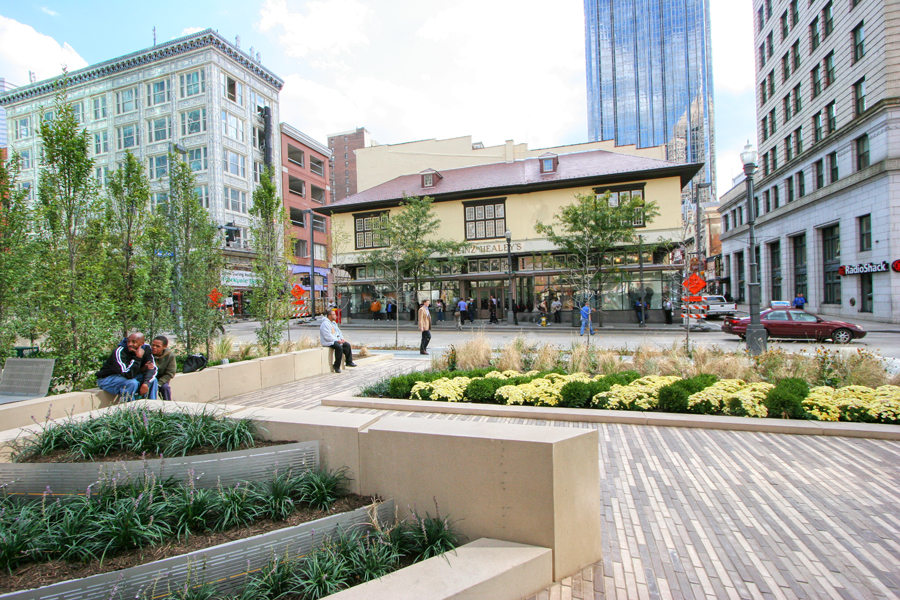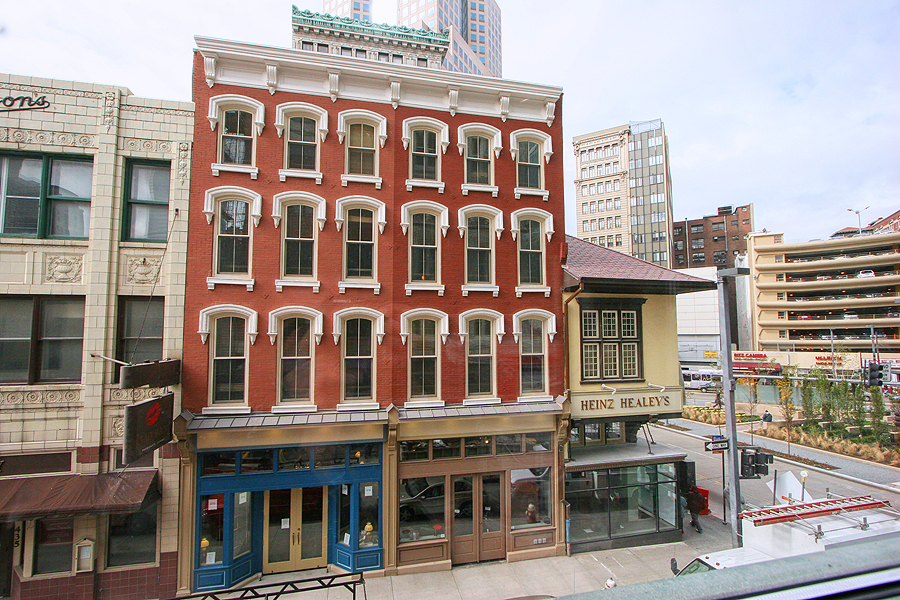
Category Archive: Downtown Development
-
Foundations Aid Pittsburgh YWCA’s Green Roof
By Bill Zlatos
PITTSBURGH TRIBUNE-REVIEW
Thursday, June 17, 2010The YWCA is getting a green roof, part of a campaign by charitable foundations to make Downtown more environmentally friendly.
“We’ve seen an increasing number of green roofs in Pittsburgh in the past three years, some of which are Downtown,” said Aurora Sharrard, director of innovation for the Pittsburgh Green Building Alliance.
When its roof is completed, the YWCA will join the Highmark Building, Fifth Avenue Place and the Heinz 57 Center among Downtown buildings with green roofs, she said. The Allegheny County Office Building also is installing one.
Green roofs use plants to soak up rain and reduce runoff, cut heating and air conditioning costs, make the building quieter and improve air quality.
Reducing runoff is especially important in Allegheny County because storm and sewage overflow is released into the rivers during hard rains.
“We want an environmentally responsible green roof,” said Carmelle Nickens Phillips, the YWCA’s vice president of development and communications. “It provides a lot of benefits — a longer material lifespan, energy savings, sound insulation, and it’s really compatible with the neighborhood.”
Phillips cited neighboring Point Park University’s $244 million Academic Village. The university’s plan includes street improvements and tree plantings on Boulevard of the Allies at the end of July and converting the old YMCA building on the boulevard into a Student and Convocation Center. The university completed a dance studio that has a gold certification in Leadership in Energy and Environmental Design, or LEED, from the U.S. Green Building Council.
“We’re very excited about continuing our part of neighborhood enhancements that are green-based and are pleased to know that other neighbors are doing so as well,” said Point Park spokeswoman Mary Ellen Solomon.
The cost of the YWCA roof is $1.1 million. Its building on Wood Street is 42 years old.
The Richard King Mellon Foundation gave the YWCA $125,000 and the Eden Hall Foundation gave $50,000 — raising the total amount from foundations to nearly $400,000. The Mellon Foundation agreed to provide a challenge grant within the next 18 months, and the Pennsylvania Redevelopment Assistance Capital Program will provide $500,000.
Scott Izzo, director of the Mellon Foundation, declined comment. Officials with Eden Hall could not be reached.
-
Study Offers 6 Options for Mellon Arena
By Jeremy Boren
PITTSBURGH TRIBUNE-REVIEW
Thursday, June 17, 2010Demolishing Mellon Arena would make way for a mix of new homes and high-end office space covering nine city blocks in the lower Hill District, according to a study released Wednesday.
The 107-page report provides the first detailed look at six scenarios, which include restoring the arena to its original 1961 design; mothballing it indefinitely; preserving its unique silver dome; and razing it to build 1,191 residential units and 608,000 square feet of offices.
Representatives of the city-county Sports & Exhibition Authority said last week that they favor demolishing the Igloo and allowing the Penguins to build a mixed-use development — a plan referred to as “Option 5” in the study, prepared by consultant Michael Baker Engineering of Moon.
The firm organized seven meetings and a tour of Mellon Arena for public input. The lengthy report is the result and is open to public comment and revision.
The SEA, which owns Mellon Arena, will consider comments on the report before the authority’s board of directors makes a decision on the arena’s fate, said Chris Cieslak, a consultant working with Oxford Development and the SEA.
“What we don’t want is what has happened in Portland, Oregon, where they have talked about it for nine years and the city of Portland has had to pay the holding costs on (Memorial) Coliseum,” Cieslak said. Groups have opposed razing the Pacific Northwest arena.
Penguins President David Morehouse said the team agrees with the report’s findings, which correspond to a market analysis performed by Penguins consultant AECOM.
He wants demolition of Mellon Arena to begin in a year. The team owns the rights to develop the site.
“The last thing we want to do is put an impediment in front of a developer and say: ‘We want you to put this development in but, by the way, you have to put it underneath this dome,'” Morehouse said. “The people proposing that have no developers and no money for that.”
Those trying to save the arena from destruction are surprised by the study’s release. Architect Rob Pfaffman, founder of the Reuse the Igloo group, said he wasn’t aware the full report was available until told by a reporter.
Pfaffman’s vision is to build a boutique hotel inside the arena with retail and open-air park space.
“They have gone on the record, at least with us, that they prefer Option 5,” Pfaffman said. “We don’t think the process was properly followed.”
Pfaffman’s preservation group hired its own consultant to examine alternatives to tearing down the 49-year-old arena — the National Hockey League’s oldest venue. Mellon Arena will be replaced by the $321 million Consol Energy Center when it opens in August across Centre Avenue.
Pfaffman said if the SEA was sincere about finding alternatives to demolishing Mellon Arena, the authority would conduct a more detailed study and perform an engineering analysis of the building.
Neither has occurred.
The study said that in addition to making room for office space and homes, demolishing the arena would allow three north-south streets to be built. The streets would connect Bedford and Centre avenues — roads that planners eliminated when building the arena.
Razing the arena also would provide space for 208,750 square feet of retail development; a 150-room hotel; 2,145 parking spaces; and 57,560 square feet of “public open space located along pedestrian corridors,” the study said.

-
Construction to Begin on Connelley Center Project Next Fall
Wednesday, June 16, 2010
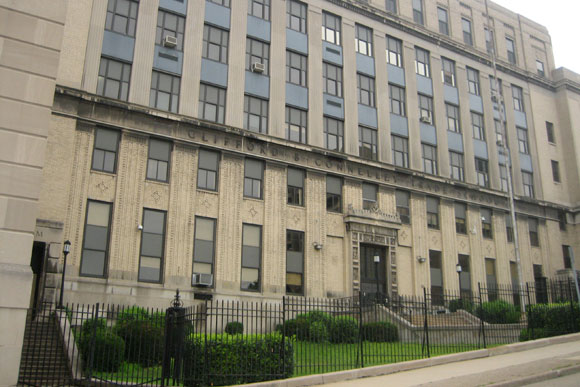
The former Clifford B. Connelley Vocational School will be converted into a green center for sustainable education.
State Senator Jim Ferlo and the board of Pittsburgh Green Innovators hosted tours of the former Clifford B. Connelley Vocational School last Thursday in the Hill District, in order to explain the progress that has taken place in their project to turn the former high school into a green center for sustainable education. The Connelley Project will be a major force in Pittsburgh’s movement towards green workforce development.
The Connelley project is organized by a partnership between Pittsburgh Green Innovators, and the developer Pittsburgh Gateways Incorporated, who are currently leasing the building from the school district. The school district had to shut it down in 2004 due to funding issues.
“The building purchase will be finalized in August, once the school board has finished moving all of its equipment out,” explains Deno de Ciantis, director of the Penn State Center, which plans to be an anchor program in the building.
After the purchase is made, the project will enter phase one of building construction. Both PGI and Green Innovators expect it should be completed by Fall of 2011. They intend to develop approximately 190,000 square feet of the facility’s 230,000 square feet.
“Capital fundraising efforts are on track. Upgrades to the building will include deep energy retrofits, the purchase of energy production equipment, and costs associated with LEED certification,” says Senator Ferlo.
Although a wide number of organizations have expressed interest in securing space at the building, de Ciantis says that leasing on spaces will not begin until after the purchase has been made. What de Ciantis and Ferlo are certain about, however, is that using the Connelley building to educate and train students and adults with the skills they need to excel in green job fields is critical to the growth of the green economy in Pittsburgh.
Writer: John Farley
Sources: Deno de Ciantis, Director of the Penn Center
Senator Jim FerloPhotograph Copyright John Farley
-
Former School to Become Green Center
Friday, June 11, 2010By Diana Nelson Jones, Pittsburgh Post-Gazette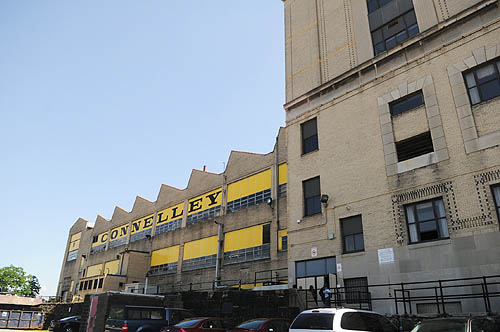
The old Connelly Technical Institute is planned to be used as a business incubator.
The 80-year-old former Connelley Technical Institute in the Hill District is slated to become a green technology demonstration showcase under the ownership of Pittsburgh Green Innovators Inc.
PGI has a sales agreement with Pittsburgh Public Schools and expects to close this summer and begin retooling the former vocational school by fall, said Deno DeCiantis, a PGI board member and director of the Penn State Center, an outreach service for Penn State University in Pittsburgh.
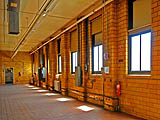
Now vacant, the fifth floor of the "Academic Tower" at the old Connelly Technical Institute contained a full-size commercial kitchen for its culinary students.
The Bedford Avenue school was closed in 2004. It has 220,000 square feet of space. When retrofitted, it will be loaded with green technology to demonstrate function and to absorb the building’s costs.
The prospective new owners envision the site as an incubator of green industry, a job training center for green-industry jobs and a technical support center for work force development.

Now used as storage space, the fifth floor of the "Academic Tower" at the old Connelly Technical Institute previously served as a full-size commercial kitchen for its culinary students.
“There are so many jobs that will be created under the broad theme of energy independence,” said state Sen. Jim Ferlo, D-Highland Park, a PGI board member.
PGI is a collaboration of representatives from universities, labor unions, the Green Building Alliance, Hill House and a dozen other entities, plus Mr. Ferlo, state Rep. Jake Wheatley, D-Hill District, and U.S. Rep. Mike Doyle, D-Forest Hills.
Board members led two public tours of the building Thursday, from the spacious top floor with a view of the North Side to the darkened corridors lined with lockers to the ground floor of classrooms that are sky-lit by a sawtooth roof.
State grants of $4 million will enable the organization to create a geothermal pumping system that is expected to provide the building with 65 percent of the energy it will need, said Bill Miller of Pittsburgh Gateways, a nonprofit developer. The extension’s sawtooth roof — each panel of which slants toward the south — “is oriented perfectly for solar panels,” said Mr. DeCiantis.
“There’s nothing we’re doing that isn’t green” Mr. Miller said. Besides the geothermal system, he said, “the rest of our energy will come from solar, wind and microturbines fueled by different energy sources. We will do high-performance glazing, have a green roof, rain gardens and bioswales.”
Mr. DeCiantis said the first phase of retrofitting the building will be under way by fall.
The sales price will be about $200,000, Mr. Ferlo said, because PGI will take over the costs and burdens of remediation and rehabilitation that normally would be required of the seller.
The organization has raised $17 million from public and private donations toward an estimated $16.5 million for first-phase renovations, Mr. Miller said. The entire project will cost about $40 million, he said.
Two years ago, the initiative began establishing an alliance of unlikely collaborators: the Sierra Club, smart-growth advocates, labor leaders and academics.
Anchor tenants will be Penn State and the International Union of Operating Engineers Local 95.
When the project was in the early stage, founding board member Bernie Lynch said the organization’s goal “is to bring all these sectors together to make this an economic hotbed.”
-
SEA Consultants Advise Razing Mellon Arena
By Adam Brandolph
PITTSBURGH TRIBUNE-REVIEW
Thursday, June 10, 2010Consultants for the city-county Sports & Exhibition Authority recommended in a draft report sent to the state Bureau of Historic Preservation that Mellon Arena be demolished and the 28-acre Uptown site be developed, SEA officials confirmed Wednesday.
The report, according to Chris Cieslak, a consultant working with Oxford Development and the SEA, “evaluates several alternatives,” but concludes that the Penguins’ plan to demolish the arena and construct a mixed-use development on the site would have the greatest economic benefit to the region. A full copy of the report, which was sent to the preservation bureau last month, was not available.
Representatives from two groups seeking alternatives to demolition walked out of last night’s closed-door meeting with SEA officials and other interested parties because they said the historic preservation process is not being followed.
“Their process is designed to divide and conquer,” said architect Rob Pfaffman. “The democratic process is being badly managed and badly executed.”
The SEA has hosted six other closed-door meetings that included developers and preservationists. A public meeting was held in the lower Hill District last month.
The $321 million Consol Energy Center is set to open across the street from the 49-year-old arena this summer. The main tenant, the Penguins, own the rights to develop the property.
Pittsburgh Mayor Luke Ravenstahl, Allegheny County Executive Dan Onorato and other public officials have said Mellon Arena should be demolished to create room for retail and housing developments. The Sports & Exhibition Authority — whose members are appointed by the mayor and county executive — has the final say on what will happen but has not made public any decision.
The preservation bureau has 30 days to review the draft report, while a consulting firm hired by the two groups seeking alternatives to demolition completes its own study.
“Everybody’s trying to beat the clock now,” said Todd Poole, managing principal of 4Ward Planning, representing Preservation Pittsburgh and ReUse the Igloo. “Obviously, I think from the standpoint of my clients, they would prefer that the process not be rushed.”
Poole hopes to have a “fully fleshed-out analysis that covers all the bases that we’ve discussed to this point” by early July. Poole said the SEA consultant’s plan falls short of a full analysis of what could be done with the arena. He said adding more retail space to an area with vacancies is a poor idea.
Gary J. English, a Penn Hills resident who filed for the Igloo’s historic preservation and has attended the SEA’s closed-door meetings, wants Allegheny County voters to decide the fate of the arena with a ballot initiative.
“I think the whole process is a farce,” English said. “They had one public meeting in the Hill District, but (the arena’s) owned by the residents of the entire county.”
-
HRC Gives Conditional Nod to Apartments in Old Uptown School
Thursday, June 03, 2010By Diana Nelson Jones, Pittsburgh Post-GazetteThe Historic Review Commission Wednesday conditionally approved the plans of an investment group to renovate the former Fifth Avenue High School, Uptown, into 65 rental lofts.
Casey Steiner and Jonathan Hill, on behalf of the new owner, an investment partnership called LMS 5th LP, said they propose to restore the exterior to national historic standards and build a new parking lot of two levels, the higher about 3.5 feet above sidewalk level on the Fifth Avenue side to be accessible to the handicapped.
Provided financing “falls into place,” Mr. Steiner said, work on the 5th Avenue School Lofts could be under way by fall. “We’re pretty confident.”
The market, he said, is graduate students, empty nesters, people who work Downtown, in Oakland, at Mercy Hospital and Duquesne University.
The commission’s conditions are that the development partners provide more detail of the composition of concrete facing on the parking deck, screening of the deck and railings.
The investors provided historic planner Katherine Molnar proof of approval from the U.S. Department of the Interior, which is charged with upholding historic standards. The former school is a nationally designated historic structure, and the investment will receive federal historic tax credits.
Mr. Steiner, president of Impakt Development, said the partnership paid $640,000 last year for the building from Excel Kitchens, which operated out of a small part of the school, which was built in 1894, closed in 1976 and was otherwise empty that long.
In other matters, the commission approved Eat’n Park Hospitality Group’s plan to build a restaurant in Schenley Plaza, nearest where Forbes Avenue and Pennant Place meet.
The building will have two living walls, a green roof on which herbs and vegetables will be grown for the restaurant and a rain barrel will collect water. It will be one-story, built of limestone, red cedar, a metal canopy, glass and stacked stone. Facing the park, it will have a “transitional patio” — covered but without walls, said Mark Broadhurst of the Eat’n Park Hospitality Group. It has not been named but will not be called Eat’n Park, he said.
The project is being financed by the hospitality group, said Mr. Broadhurst. The group will lease from the Pittsburgh Parks Conservancy.
-
Apartments Leasing Downtown
PHLF News
November 5, 2009Of the seven apartments at Market at Fifth, four are leased, a studio with a study is currently available, and two of two-story penthouse apartments with expansive roof decks overlooking our green and growing roof with wonderful views of the architecture of downtown Pittsburgh are still available. Please call Michael at 412-471-5808 for leasing information.
-
Market at Fifth Receives National Housing & Rehabilitation Association Award
PHLF News
November 3, 2009The National Housing & Rehabilitation Association (NH&RA) recently presented its 2009 J. Timothy Anderson Awards for Excellence in Historic Rehabilitation to ten outstanding historic rehabilitation projects throughout theU.S. The awards were presented at a special luncheon during NH&RA’s 2009 Annual Fall Developers Forum conference at the Taj Hotel to honor outstanding real estate projects that involved rehabilitation of older, historic buildings using the federal historic rehabilitation tax credit. This year’s nominees competed in eight categories.
This year’s categories, and the winners in each, are as follows:
Best Mixed-Income Residential
Baker Square II, Dorchester, MA
Developer: WinnDevelopment, Boston, MA
Architect: The Architectural Team, Chelsea, MABest Market-Rate Residential
Market at Fifth, Pittsburgh, PA
Developer: Market at Fifth, LP, Pittsburgh, PA
Architect: Landmarks Design Associates, Pittsburgh, PABest Historic Rehabilitation Project Utilizing New Markets Tax Credits
Court Square Center, Memphis, TN
Developers: CGI & Partners Court Square Center, LLC, Memphis, TC
Telesis Corporation, Washington, DCArchitect: CM Design Corporation, Memphis, TN
Best Commercial / Retail / Non-Residential Project
The Old Cotton Factory, Rock Hill, SC
Developer: Barwick & Associates, Charlotte, NC
Architect: McClure Nicholson Montgomery Architects, Charlotte, NCBest Historic Rehabilitation Project Involving New Construction
Globe Mills, Sacramento, CA
Developer: C.F.Y. Development Incorporated, Sacramento, CA
Architect: Applied Architecture, Inc., Sacramento, CAMost Innovative Adaptive Reuse
Charles H. Shaw Technology & Learning Center, Chicago, IL
Developer: Homan Arthington Foundation, Chicago, IL
Architect: Farr Associates, Chicago, ILBest Historic Rehabilitation Project Utilizing Low-Income Housing Tax Credits – Large
Toward Independent Living & Learning (TILL), Chelsea, MA
Developer: Toward Independent Living & Learning, Dedham, MA
Architect: Mostue & Associates Architects, Somerville, MABest Historic Rehabilitation Project Utilizing Low-Income Housing Tax Credits – Small
Fairbanks Flats Rowhomes, Beloit, WI
Developer: Gorman & Company, Inc., Oregon, WI
Architect: Gorman & Company, Inc., Oregon, WIThe “Timmy” Awards were created by NH&RA in 2005 in memory of the late Boston architect and preservation advocate J. Timothy Anderson, a leader in the historic rehabilitation business. Throughout his career, Tim helped pioneer the adaptive reuse of historic buildings throughout Boston and other parts of the U.S. Tim’s notable Boston-area projects include the conversion of the Prince Spaghetti Building into housing, and the adaptation of Old City Hall for mixed-use. His conversion of the old Central Grammar School in Gloucester into housing for the elderly became a national prototype for the reuse of surplus schools in urban areas.
The federal historic rehabilitation tax credit is a primary tool used to generate equity to preserve and rehabilitate historic properties. The rehabilitation credit is a “two-tiered” credit, because there are two possible rates for calculating of the credit amount. The 20% credit is available for income-producing buildings that are considered certified historic structures. The 10% credit is available for non-residential, income-producing buildings originally constructed before 1936, which are not certified historic structures. Historic tax credits are often paired with other federal, state and local tax credits and subsidies and are often used in the development of affordable and market-rate rental housing as well as commercial, retail and industrial developments
For more than 38 years, National Housing & Rehabilitation Association has provided an ongoing forum for professionals in affordable housing and historic rehabilitation to exchange information and build new business relationships. For more information on the “Timmy” Awards, the Fall Developers Forum or NH&RA please visit www.housingonline.com or contact Greg Sidorov, 202-939-1773, gsidorov@dworbell.com.
The 2009 J. Timothy Anderson Awards for Excellence in Historic Rehabilitation are co-sponsored by the National Trust Community Investment Corporation, a subsidiary of the National Trust for Historic Preservation.

